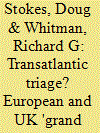| Srl | Item |
| 1 |
ID:
167140


|
|
|
|
|
| Summary/Abstract |
In the post-Cold War period, the European Union’s neighbourhood policy towards its emerging eastern neighbours aims to surround the European Union (EU) with a ring of secure, stable and prosperous neighbouring countries. Advancing conflict transformation through cross-border cooperation initiatives constitutes a crucial part of the European neighbourhood policy. Cross-border interaction and cooperation are expected to lessen the heavy burden of sealed borders by decreasing isolation and indifference and promoting mutual interaction, dialogue and confidence-building between conflicting parties. However, there are several ethno-political contestations whose historical animosities cast a shadow on the effectiveness of the EU’s neighbourhood and cross-border cooperation policies for conflict transformation. The Turkish-Armenian case testifies to the persistence of physical and mental borders that stem from competing historical memories, longstanding grievances and contesting national claims, as well as from regional dynamics. This article aims to assess the impact of the EU’s neighbourhood policy and cross-border cooperation initiatives on conflict transformation on the Turkish-Armenian border. The EU’s policies have remained partially relevant and effectual by initiating interaction and dialogue at the civil societal level. Advancing conflict transformation at the political level, however, would require the EU to develop a more comprehensive framework that considers the cross-cutting context of the competing historical memories and regional dynamics and shifts that currently undermine the impact of further transformative attempts.
|
|
|
|
|
|
|
|
|
|
|
|
|
|
|
|
| 2 |
ID:
123881


|
|
|
|
|
| Publication |
2013.
|
| Summary/Abstract |
Transition in the Middle East, the ongoing effects of the global financial crisis and the United States' rebalance to Asia are key trends that will have an impact on transatlantic relations and European defence. As US priorities shift, a common European 'grand strategy' could encourage the development of a shared vision to help Europe order its priorities and begin to respond to the new, post-austerity context of world politics and shrinking defence budgets.
Will these changes be enough to quicken Europe's currently shrivelled strategic thinking? In any scenario, given its relative weight and role as an interlocutor with the US, the United Kingdom will remain vital to any developing European security and strategy agenda, although its broader relations with the European Union will complicate this relationship. How it proceeds will also help to define the boundaries of this nascent European security order.
This article charts these key global trends, relates them to current debates in European security and strategy and maps opportunities and constraints faced by Europe and the UK in developing a grand strategy in an increasingly 'American-lite' European neighbourhood.
|
|
|
|
|
|
|
|
|
|
|
|
|
|
|
|